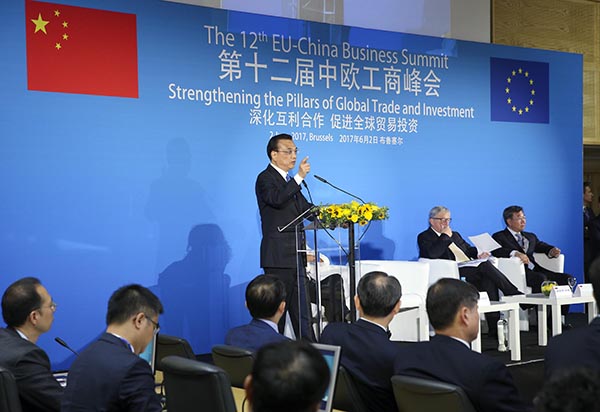 |
|
Chinese Premier Li Keqiang delivers a keynote speech at the 12th EU-China Business Summit in Brussels on June 2, 2017. [Photo provided to chinadaily.com.cn] |
In the last 60 years, the European Union has expanded from six members to 28, but the battle over the responsibilities of Brussels and individual EU states has not abated. The latest skirmish is over Brussel's eagerness to centralize the approval process for European companies' takeovers by foreign enterprises amid an explosion of Chinese investment in the EU.
Brussels wants to strengthen the approval procedures for foreign investors that target "key technologies for security reasons", and European Commission President Jean-Claude Juncker is likely to announce regulation options in September.
Some EU member states argue such a move is not necessary because many of them already have such screening process in place. There are many reasons why Brussels considers such regulation important. However, there is a need for the EU to be cautious while it is in the process of shaping the bloc's future.
The United Kingdom's decision to break away from the EU was at the heart of the debate over the responsibilities of the EU and its members states. Hence, the EU must consider whether adding another layer of red tape will put internal cohesion, efficiency and economic growth at risk.
As a champion of free trade, the EU needs to recognize that other economic powers are removing trade and investment restrictions. For example, China is now trimming its approval regulations and documents to meet its reform goals, in order to ensure that investment approvals are completed at the provincial or local level, instead of needing the green light from the central government to finalize each and every deal.
To improve its efficiency, perhaps the EU should follow China's example of economic decentralization. The EU's proposed investment restrictions come on the heels of a similar move by the United States, which keeps taking steps to close the door on Chinese investment.
Washington has built trade barriers, on the pretext of security reasons, to prevent China's telecommunications giant Huawei from venturing into the US, but the EU has welcomed Huawei, which has created 11,000 jobs in Europe. Huawei's contribution to the job market has yielded excellent results in the past six years, during a good part of which many parts of the EU were fighting recession.
The EU's open attitude toward investment created a win-win situation. China has rapidly improved its competence in technologies through investment, trade and transfer of knowledge with the EU, the US and other countries. When formulating new policies, therefore, the EU should consider if these policies will contribute to economic growth or retard it. And if the effects of the policies are likely to harm growth, it should discard them.
In the evolving and turbulent global situation, the EU must shoulder its responsibilities while it ponders its future. It should assert its independence from the US in defense and high-tech industries. Only free trade of technologies can help turn win-win potential into reality. It is now for the EU to decide whether building trade barriers is conducive to the economic growth of the bloc and the rest of the world or harmful to all.
The author is deputy chief of China Daily European Bureau.
fujing@chinadaily.com.cn